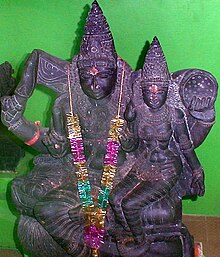
Back Ida (Hinduismus) ALS ইলা (দেৱতা) Assamese ইলা Bengali/Bangla Ila Czech Ida (Hinduismus) German इला Hindi Ila (putri Manu) ID Ila (induismo) Italian イラー Japanese ഇള (പുരാണകഥാപാത്രം) Malayalam
| Ila/Ilā | |
|---|---|
 Budha (Mercury) with consort Ilā | |
| Devanagari | इल/इला |
| Sanskrit transliteration | Ila/Ilā |
| Affiliation | Devi |
| Abode | Budhaloka |
| Mantra | Om Illaya Namah |
| Genealogy | |
| Parents |
|
| Siblings | Ikshvaku and 9 others |
| Consort | Budha (as a woman) |
| Children | Pururavas (son as a woman) Utkala, Gaya and Vinatashva (sons as a man) |
Ila (Sanskrit: इल) or Ilā (Sanskrit: इला) is a deity in Hindu legends, known for their sex changes. As a man, he is known as Ila or Sudyumna and as a woman, is called Ilā. Ilā is considered the chief progenitor of the Lunar dynasty of Indian kings – also known as the Aillas ("descendants of Ilā").
While many versions of the tale exist, Ila is usually described as a daughter or son of Vaivasvata Manu and thus the sibling of Ikshvaku, the founder of the Solar Dynasty. In versions in which Ila is born female, she changes into a male form by divine grace soon after her birth. After mistakenly entering a sacred grove as an adult, Ila is either cursed to change his/her gender every month or cursed to become a woman. As a woman, Ilā married Budha, the god of the planet Mercury and the son of the lunar deity Chandra (Soma), and bore him a son called Pururavas, the father of the Lunar dynasty. After the birth of Pururavas, Ilā has transformed into a man again and fathered three sons.
In the Vedas, Ilā is praised as Idā (Sanskrit: इडा), goddess of speech, and described as the mother of Pururavas.
The tale of Ila's transformations is told in the Puranas as well as the Indian epic poems, the Ramayana and the Mahabharata.